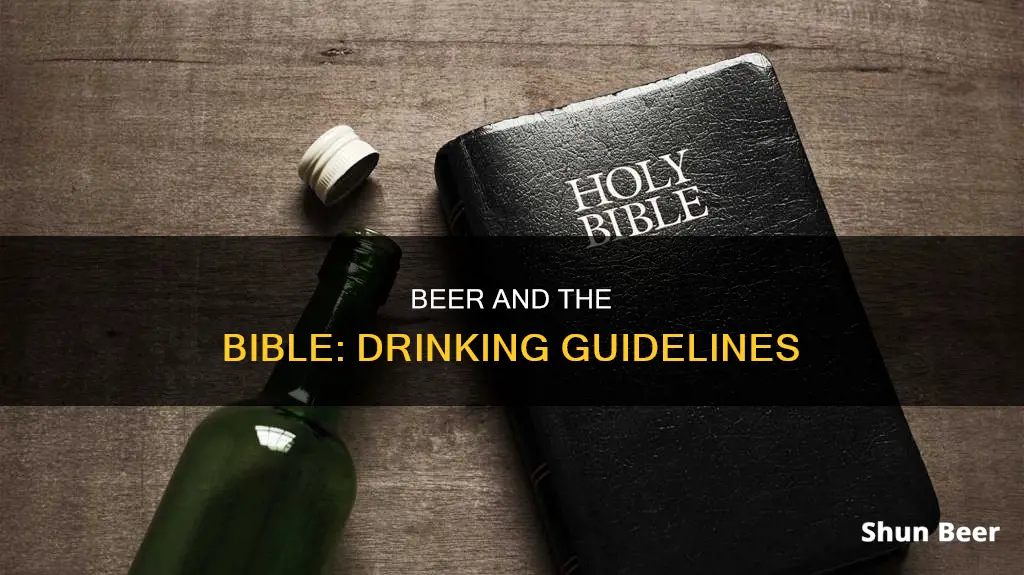
Alcohol consumption is a topic that the Bible addresses extensively, and while it does not explicitly forbid Christians from drinking beer, wine, or other alcoholic beverages, it emphasizes the importance of moderation and avoiding drunkenness. The Bible contains numerous references to alcohol, including passages that discuss its positive aspects and those that caution against its excessive consumption. For instance, Ecclesiastes 9:7 encourages drinking wine with a merry heart, while Psalm 104:14-15 highlights God's gift of wine to gladden the hearts of men. However, drunkenness is strongly condemned in the Bible, with passages like Ephesians 5:18 instructing believers to avoid getting drunk and instead be filled with the Spirit. Ultimately, the Bible's message on alcohol centers on responsible consumption, warning against the dangers of addiction and the negative consequences that can arise from excessive drinking.
| Characteristics | Values |
|---|---|
| Whether drinking alcohol is a sin | No |
| Whether drinking alcohol is acceptable | Yes, in moderation |
| Whether drunkenness is a sin | Yes |
| Whether drinking alcohol is wise for church leaders | No |
What You'll Learn

The Bible does not forbid drinking alcohol
The Bible mentions wine in several passages and even mentions it being part of heaven. Ecclesiastes 9:7 instructs: "Drink your wine with a merry heart." Psalm 104:14-15 states that God gives wine "that makes glad the heart of men." Amos 9:14 discusses drinking wine from your own vineyard as a sign of God's blessing. Isaiah 55:1 encourages: "Yes, come, buy wine and milk."
Jesus turned water into wine, and Paul recommended wine for health reasons. However, the Bible also contains warnings about overindulgence. The Apostle Paul, inspired by the Holy Spirit, clearly instructs believers not to be drunk, which is a sin. Ephesians 5:18 says: "Do not get drunk on wine, which leads to debauchery. Instead, be filled with the Spirit."
The Bible allows Christians to drink alcohol for medical reasons. Paul told Timothy: "Stop drinking only water and use a little wine because of your stomach and your frequent illnesses." (1 Timothy 5:23) In New Testament times, a little wine was considered good for the stomach.
The Bible sometimes portrays alcohol as something good and enjoyable. King Solomon enjoyed his meals and wine. It was important to gather with family and friends and enjoy time together with good food and wine. Ecclesiastes 9:7 says: "Go, eat your food with gladness, and drink your wine with a joyful heart, for God has already approved of what you do."
The Bible forbids drinking alcohol if it offends fellow believers. Romans 14:15-21 says: "Don't destroy the work of God for the sake of food. [...] It is better not to eat meat or drink wine or to do anything else that will cause your brother or sister to fall." The Bible also forbids drinking alcohol if it hinders the gospel. Paul explained in 1 Corinthians 9 that although he was allowed to eat and drink anything, he was careful not to do things that would hinder the gospel of Christ.
The Bible warns that drinking alcohol is often dangerous and unwise. Proverbs 31:4-5 advises rulers against drinking alcohol because it can impair judgment and lead to poor decision-making: "It is not for kings, O Lemuel, it is not for kings to drink wine, nor for princes intoxicating drink; lest they drink and forget the law, and pervert the justice of all the afflicted."
In conclusion, while the Bible does not forbid drinking alcohol, it is important for Christians to reflect on whether alcohol enhances their spiritual life. The Bible notes that while many things may be permissible, not all are beneficial. Jesus offers freedom from all kinds of bondage, including addiction, and provides a path to healing and forgiveness.
Beer and Ulcerative Colitis: What's the Verdict?
You may want to see also

Drunkenness is a sin
While the Bible does not forbid Christians from drinking beer, wine, or any other alcoholic drink, drunkenness is a sin. The Bible condemns drunkenness and its effects, and Christians are commanded to not allow their bodies to be controlled by anything. Drunkenness can lead to addiction, which is also considered a sin.
The Bible contains many warnings about the dangers of alcohol and the importance of staying sober. For example, Ephesians 5:18 says, "Do not get drunk on wine, which leads to debauchery. Instead, be filled with the Spirit." Similarly, Proverbs 23:29-30 asks, "Who has woe? Who has sorrow? Who has strife? Who has complaints? Who has needless bruises? Who has bloodshot eyes? Those who linger over wine, who go to sample bowls of mixed wine."
The apostle Paul also wrote about the dangers of drunkenness, saying, "Do not give way to drunkenness and the ruin that goes with it" (Ephesians 5:18). He warned that drunkenness can keep a person out of the Kingdom of God (Galatians 5:21) and that those who live immoral lives, including drunkards, will have no share in His Kingdom (1 Corinthians 6:9-11).
In addition to the spiritual consequences, alcohol abuse can cause significant harm to the drinker, their family, and society. It can lead to premature death and has been linked to poverty (Proverbs 23:21).
Given the potential for excess and the negative impact on others, some Christians choose to abstain from alcohol completely. However, the Bible does not require total abstinence, and moderate alcohol consumption is generally considered acceptable. As stated in 1 Corinthians 10:31, "So, whether you eat or drink, or whatever you do, do everything for the glory of God."
Breastfeeding and Beer: Is It Safe to Drink Alcohol?
You may want to see also

Drinking alcohol in moderation is not a sin
However, Scripture also warns against drunkenness and its effects (Proverbs 23:29-35) and commands Christians not to allow their bodies to be "mastered" by anything (1 Corinthians 6:12; 2 Peter 2:19). Drinking alcohol in excess is addictive, and Christians are also commanded not to do anything that might offend other Christians or encourage them to sin against their conscience (1 Corinthians 8:9-13). Therefore, while drinking alcohol in moderation is not a sin, drunkenness and addiction to alcohol are sins that Christians must absolutely refrain from (Ephesians 5:18; 1 Corinthians 6:12). Drinking alcohol in moderation is not a sin. The Bible does not forbid Christians from drinking beer, wine, or any other alcoholic beverage. In fact, some passages of Scripture discuss alcohol in positive terms. For example, Ecclesiastes 9:7 instructs, "Drink your wine with a merry heart," and Psalm 104:14-15 states that God gives wine "that makes glad the heart of men."
However, the Bible does command Christians to avoid drunkenness (Ephesians 5:18) and its effects (Proverbs 23:29-35). Christians are also warned against allowing their bodies to be "mastered" by anything (1 Corinthians 6:12; 2 Peter 2:19), as drinking alcohol in excess can lead to addiction.
Due to the potential for alcohol abuse and the negative consequences that can result, it is often best for Christians to abstain from drinking alcohol altogether (1 Corinthians 10:31). This is especially true for church leaders, who are held to a higher standard and need to be ready to serve at any time, with clear heads and unimpaired judgment.
In conclusion, while drinking alcohol in moderation is not inherently a sin, Christians should exercise wisdom and caution when it comes to alcohol consumption, always being mindful of how it may affect them and those around them.Drinking alcohol in moderation is not a sin. The Bible does not forbid Christians from drinking beer, wine, or any other alcoholic beverage. In fact, some passages of Scripture discuss alcohol in positive terms. For example, Ecclesiastes 9:7 instructs, "Drink your wine with a merry heart," and Psalm 104:14-15 states that God gives wine "that makes glad the heart of men."
However, the Bible does command Christians to avoid drunkenness (Ephesians 5:18) and its effects (Proverbs 23:29-35). Christians are also warned against allowing their bodies to be "mastered" by anything (1 Corinthians 6:12; 2 Peter 2:19), as drinking alcohol in excess can lead to addiction.
Due to the potential for alcohol abuse and the negative consequences that can result, it is often best for Christians to abstain from drinking alcohol altogether (1 Corinthians 10:31). This is especially true for church leaders, who are held to a higher standard and need to be ready to serve at any time, with clear heads and unimpaired judgment.
In conclusion, while drinking alcohol in moderation is not inherently a sin, Christians should exercise wisdom and caution when it comes to alcohol consumption, always being mindful of how it may affect them and those around them.
Beer, Guns, and Georgia Laws: What's Allowed?
You may want to see also

Drinking alcohol may cause others to stumble
The Bible does not forbid Christians from drinking beer or alcohol. However, drinking alcohol in excess is addictive and can lead to drunkenness, which is considered a sin.
> Be careful, however, that the exercise of your freedom does not become a stumbling block to the weak.
The Bible encourages Christians to be mindful of their actions and how they may impact others. In Romans 14, Paul provides guidance for navigating situations where people who follow God come to different conclusions about their conduct. He advises that it is okay for some Christians to adhere strictly to certain laws while others exercise their freedom in Christ.
However, he also emphasizes the importance of sacrificing for others and showing love by respecting their limits, even if they differ from one's own. This is further supported by Romans 14:20-21:
> It is wrong for anyone to make others trip and fall by what they eat or drink. Yes, eat, drink, or do anything else, but do it all for the glory of God.
Ultimately, the Bible advises Christians to be sensitive to the weaknesses of others and to prioritize edification and peace within the community, even if it means sacrificing some personal freedoms.
Beer and Clonazepam: Safe Mix or Risky Business?
You may want to see also

Drinking alcohol may lead to addiction
While the Bible does not forbid Christians from drinking alcohol, it is important to recognize the dangers of alcohol consumption, as outlined in Scripture and various health sources. Drinking alcohol may lead to addiction, a chronic relapsing disorder associated with compulsive alcohol drinking and a loss of control over intake. This progression towards addiction can be understood through three stages: the binge/intoxication stage, the negative affect/withdrawal stage, and the preoccupation/anticipation stage.
The binge/intoxication stage is marked by the rewarding effects of alcohol, such as euphoria, reduced anxiety, and improved social interactions. The basal ganglia, a key region of the brain, is activated during this stage, reinforcing drinking behavior and increasing the likelihood of repeated consumption.
However, as individuals continue to drink alcohol, they enter the second stage, experiencing negative affect/withdrawal symptoms. This stage is characterized by physical and emotional symptoms, including sleep disturbances, pain, dysphoria, irritability, and anxiety. The basal ganglia's reward system becomes diminished, making it difficult to experience the pleasures of everyday life.
The third stage, preoccupation/anticipation, is driven by the desire to escape the negative emotional state caused by alcohol withdrawal. The prefrontal cortex, responsible for executive function, is compromised, leading to impaired decision-making and impulse control.
These stages form a repeating cycle of addiction, where individuals seek alcohol to relieve negative emotions, only to become further trapped in the cycle. It is essential to recognize that alcohol consumption can lead to addiction, and the potential consequences include interference with personal relationships, health issues, and social problems.
The Bible provides guidance on this matter, emphasizing the importance of avoiding drunkenness and the negative effects of excessive alcohol consumption. Christians are commanded not to allow their bodies to be "mastered" by anything (1 Corinthians 6:12; 2 Peter 2:19), and drunkenness is considered a sin. While moderate alcohol consumption may be permissible, it is the responsibility of Christians to avoid excess and to consider the well-being of others around them.
Beer Drinkers and Kidney Donors: Is it Possible?
You may want to see also
Frequently asked questions
Drinking alcohol is not a sin, but drunkenness is. The Bible does not forbid Christians from drinking beer, wine, or any other alcoholic drink. In fact, some passages of Scripture discuss alcohol in positive terms. Ecclesiastes 9:7 says, "Drink your wine with a merry heart." However, Christians are commanded to avoid drunkenness and its effects (Proverbs 23:29-35; Ephesians 5:18).
While drinking in moderation is not considered a sin, Christians should be careful not to cause others to stumble and sin because of their drinking (Romans 14:21; 1 Corinthians 8:9-13). Additionally, Christians are called to present their bodies as a living sacrifice, holy and acceptable to God (Romans 12:1).
The Bible mentions wine and beer in both the Old and New Testaments. In the Old Testament, wine is described as a gift from God to gladden the hearts of men (Psalm 104:15) and was used in worship and celebrations. However, drunkenness is strongly opposed, with Proverbs 20:1 warning that "wine is a mocker, strong drink a brawler, and whoever is intoxicated by it is not wise."
In the New Testament, Jesus is seen drinking wine on occasion (Matthew 26:29) and even turned water into wine at a wedding in Cana (John 2:1-11). The apostle Paul instructed Timothy to drink wine instead of water, which was likely causing stomach problems (1 Timothy 5:23). However, Paul also warned against drunkenness, saying, "Don't be drunk with wine, because that will ruin your life. Instead, let the Holy Spirit fill and control you" (Ephesians 5:18).







